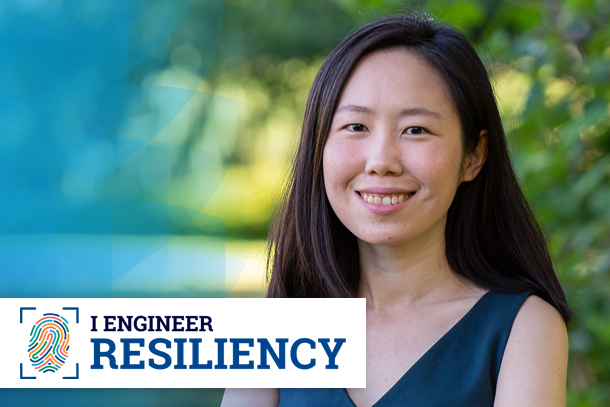
Min Liew, a recent recipient of a Penn State civil engineering doctoral degree, seeks to improve the resiliency and performance of civil infrastructure against permafrost degradation and coastal erosion in the Arctic. Credit: Kelby Hochreiter/Penn State
Min Liew: ‘I Engineer Resiliency’
September 22, 2022
“I Engineer” highlights excellence across the Penn State College of Engineering, as well as how the college is made stronger by the diversity of perspectives, experiences and backgrounds of those in the engineering community.
Min Liew is a recent recipient of a Penn State civil engineering doctoral degree. As a member of a research team led by Ming Xiao, professor of civil and environmental engineering, Liew sought to improve the resiliency and performance of civil infrastructure against permafrost degradation and coastal erosion in the Arctic. Alongside Xiao, she helped lead a Navigating the New Artic project, which brought together multidisciplinary researchers and local Indigenous community members to find solutions for securing, adapting and maintaining the built Artic environment impacted by climate change. Liew is also participating in a Signals in the Soil project, which uses fiber-optic cables to continuously monitor and understand the permafrost thaw. In January 2023, she will be joining Ohio State’s Department of Civil, Environmental and Geodetic Engineering as an assistant professor.
Here, Min Liew and other Penn State civil and environmental graduate students describe life in Utqiaġvik, Alaska, as they perform research in the Signals in the Soil project. CREDIT: Xiaohang Ji
How were you drawn to the field of engineering?
I am always interested in understanding how the Earth works and how humans can build a resilient society on Earth, especially in the face of climate change. I am also inspired by the beautiful structures built by civil engineers, such as the Golden Gate Bridge and Empire State Building, as well as life-saving structures such as the Hoover Dam.
What are you aiming to achieve?
My ultimate goal is to design a safe living place for all people regardless of their backgrounds. To me, one can only feel free to explore and push forward boundaries when their homes and lives are not threatened. So, a safe home is not only to protect lives but also to ensure the ongoing development of a country.
My current research is to improve the performance and resiliency of civil infrastructure in the Arctic, considering the impacts of climate change. This is because the degradation and erosion of permafrost due to climate change has induced irreversible damage to civil infrastructure across the Arctic. These unprecedented changes are now threatening Indigenous Arctic communities, urging them to consider community-wide relocations. Through my research, I hope to facilitate a physics informed, culturally relevant and inclusive infrastructure planning process for the Arctic community by bridging the experience of Indigenous Arctic communities and the expertise of multidisciplinary scientific communities.
What advice do you have for those considering a career in engineering?
- To me, pursuing an engineering degree meant an opportunity to improve my critical thinking and problem-solving skills, which are crucial to fulfill one’s potential. These two characteristics are emphasized in engineering curriculum. Because of these highly valued qualities and skills, engineering graduates are highly sought after in the job market — both in the engineering industry and other non-engineering industries. I would recommend those whose majors are still undecided to consider engineering first.
- Get more hands-on experience — through internships or volunteering — while sharpening your theoretical knowledge. Immersing yourself in different cultures also helps to develop cultural sensitivity and the ability to design better products for clients of different backgrounds.
- I worked as a full-time engineer before I started my graduate study. While I am currently on an academic path, the industry experience allows me to understand how an engineering firms and businesses operate. This experience is valuable for me to establish university-industry partnerships, further driving engineering innovation and shaping the future state-of-practice. So, I encourage students to pursue any opportunities of interest even when they may not seem relevant at that time.



